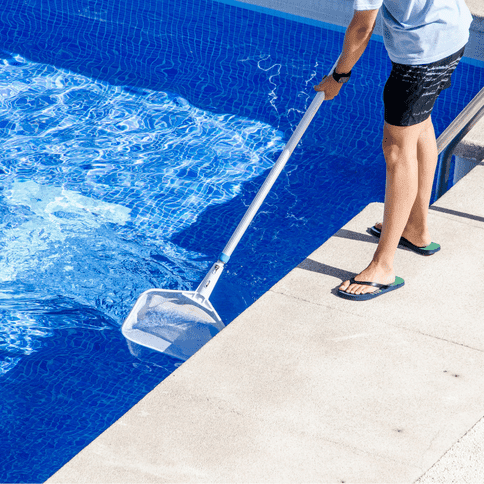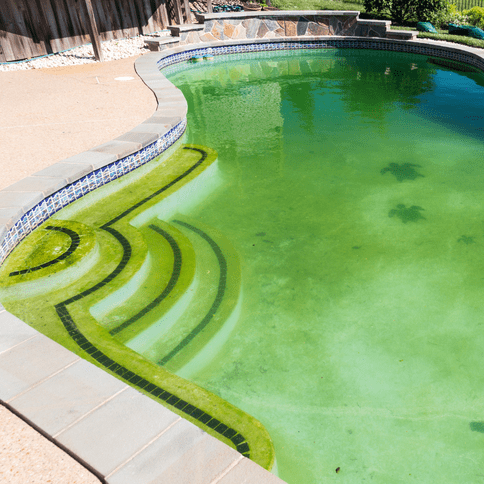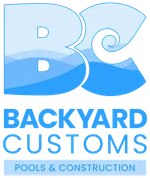Keeping your pool clean and safe doesn’t have to be complicated, especially if you live in Northwest Arkansas. Many pool owners can handle basic upkeep themselves with the right tools and knowledge. DIY pool maintenance is a great way to save money and maintain control over your pool’s health.
However, not all pool issues should be handled alone. Knowing the difference between what you can manage and when to call in professional pool services can save you time, frustration, and costly repairs in the long run.
What You Can Handle: Basic DIY Pool Maintenance

There are numerous tasks you can manage with a little effort and consistency.
1. Skimming and Removing Debris
Skim your pool daily or several times a week. Use a net to remove leaves, bugs, and other debris. This helps keep the pool water clean and your filtration system running smoothly.
2. Brushing and Vacuuming
Use a pool brush to scrub the walls, steps, and floor once a week. Follow it with manual or automatic vacuuming to collect any loose debris. This prevents algae buildup and improves water clarity.
3. Pool Water Testing
Test your pool at least once a week using strips or a digital kit. Monitor chlorine, pH, and alkalinity levels to maintain a safe and comfortable swim environment. Balanced water keeps skin, eyes, and equipment safe.
According to the CDC, pool chlorine and pH levels should be tested at least twice per day, especially during periods of frequent use, to ensure the water remains safe and free of harmful germs.
4. Pool Filter Maintenance
Whether you have a sand, cartridge, or DE filter, it needs to be cleaned regularly. Follow the manufacturer’s guidelines, but most filters should be rinsed or replaced every 1 to 3 months to remain efficient.
5. Shock Treatments
Shock your pool every couple of weeks or after heavy use. This involves adding extra pool chemicals to kill bacteria and restore water clarity, especially helpful for algae removal.
A Simple DIY Pool Maintenance Routine
Keeping your pool clean and safe doesn’t have to be complicated. With just a bit of regular attention, you can maintain clear water, extend the life of your equipment, and enjoy a worry-free swim season. For pool owners who prefer a consistent schedule, here’s an easy weekly routine to follow:
- Daily: Skim debris, check water level
- 2–3 times a week: Brush and vacuum
- Weekly: Test and adjust water chemistry
- Bi-weekly: Shock the pool
- Monthly: Clean filter and inspect equipment
Recommended Tools and Supplies
Having the right tools makes pool maintenance quicker, easier, and more effective. Whether you’re just starting or refreshing your setup, keep these essential items on hand for a smooth DIY experience:
- Pool skimmer net – for removing leaves and floating debris
- Pool brush and telescopic pole – to scrub walls, steps, and floor
- Manual or robotic vacuum – for deep cleaning the pool bottom
- Pool water test kit – to monitor chlorine, pH, and other levels
- Shock treatment chemicals – for bi-weekly or emergency sanitizing
- Filter cleaner or replacement cartridges – to maintain efficient filtration.
- Pool cover – to protect your pool during the off-season or when not in use
When to Call the Pros
Some problems are best left to professionals. Here’s when you should call:
1. Pool Pump Problems
Loud noises, low water pressure, or broken seals indicate pump issues. Don’t risk further damage; contact a pool professional for repair.
2. Green or Cloudy Water

If you’ve tried to fix cloudy pool water or algae and nothing’s working, a professional can diagnose and correct the issue more effectively.
3. Leaks or Structural Damage
Visible cracks, wet spots near the pool, or unexplained water loss require expert attention. Leak detection is precise work.
4. Electrical Issues
Any work involving pool lights or timers should be handled by a licensed technician for safety reasons.
5. Seasonal Opening or Closing
In Northwest Arkansas, it’s essential to winterize your pool in the fall and reopen it properly in the spring. A pro ensures it’s done correctly.
Safety Tips for DIY Pool Care
Pool maintenance involves working with chemicals and equipment, so safety should always be the top priority:
- Always read chemical labels and follow directions.
- Store pool chemicals in a cool, dry, safe location.
- Use gloves and eye protection when handling chlorine or other corrosive substances.
- Never mix chemicals.
- Keep children and pets away from the pool while it is being treated.
Common DIY Mistakes to Avoid
Even with the best intentions, pool owners can sometimes make small mistakes that lead to big problems. Understanding what to avoid is just as important as knowing what to do. Here are some common DIY errors that can affect water quality, damage equipment, or increase long-term maintenance costs:
- Overusing chemicals (especially chlorine)
- Ignoring filter cleaning
- Forgetting to test the water regularly
- Running the pump for too short a time (aim for 8+ hours/day)
- Not brushing or vacuuming consistently.
Common Pool Problems in Northwest Arkansas
Pools in Northwest Arkansas face unique challenges due to the region’s changing weather conditions. From hot, humid summers to sudden storms, these factors can impact water quality and maintenance needs.
- Algae can proliferate in warm, still water.
- Storms bring dirt and leaves, which clog filters.
- Unbalanced water chemistry occurs every day after rainfall.
FAQs: DIY Pool Maintenance vs. Hiring a Pro
1. Can I do pool maintenance myself, or should I hire a professional pool service?
Yes, many basic pool maintenance tasks, such as skimming, vacuuming, brushing, and testing the water, can be done by you. However, such problems as leaks, green water, or malfunctioning equipment are best handled by a professional pool service.
2. How often should I test the pool water during the summer?
Test your pool water at least once a week during summer, and more often after heavy use or rainfall. According to the CDC, chlorine and pH levels should ideally be tested at least twice daily during peak usage periods to maintain safe swimming conditions.
3. What signs show I need a professional pool technician?
Call a professional if you notice:
- Cloudy or green pool water
- Visible cracks or leaks
- Strange noises from the pump
- Electrical or lighting issues
- Water is not staying balanced despite DIY efforts.
4. How do I remove algae from my pool water?
Start by thoroughly brushing the affected areas, then shock the pool with chlorine. Keep your filter running continuously for at least 24 hours. If algae persists, consult a professional pool cleaning service to resolve the issue safely and effectively.
5. What tools are needed for basic pool maintenance?
Essential DIY pool care tools include:
- Skimmer net for debris removal
- Pool brush and telescopic pole
- Manual or robotic vacuum
- Pool water testing kit
- Shock treatment chemicals
- Filter cleaner or replacement cartridges.
Final Thoughts
DIY pool maintenance can save money and give you confidence as a pool owner, especially when you stay on top of regular tasks like water testing, filter maintenance, and basic cleaning. But don’t ignore signs that you need professional help; a good balance between self-care and expert support keeps your pool in great shape year-round.
If you’re in Northwest Arkansas, it’s easy to find reliable help when you need it. And if you’re planning to build a new pool or upgrade your current setup, BC Pools is here to support you. We design and construct high-quality residential and commercial pools tailored to your space and lifestyle.
Take a look at our completed pool projects, or contact us today to start planning your custom pool.

